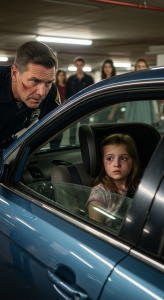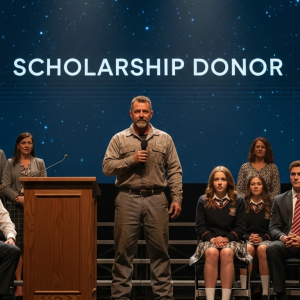Detective Jake Riley’s world had shrunk to the size of a lukewarm coffee cup and the half-finished retirement application sitting on his desk. Thirty years with the city police had chipped away at him, eroding his optimism until only a bedrock of weary cynicism remained. Each new case file was just a new verse in the same sad song of human misery.
He was staring at the application, the pen feeling heavier than his service weapon, when the call came through the squawk box. The voice was tinny, detached.
“Unit 27, we have a report of a child left in a vehicle. Northgate Mall, parking structure C, level four.”
Jake sighed, the sound a ragged mix of frustration and resignation. Another one. Another casualty of parental negligence or something far worse. He crumpled a foil gum wrapper and tossed it into the overflowing trash can. The retirement papers seemed to call his name.
The Northgate Mall parking garage was a sweltering concrete oven. The air was thick with the smell of hot asphalt and exhaust fumes. On the fourth level, a crowd of concerned shoppers had gathered around a non-descript blue sedan, its windows slightly fogged from the inside.
Jake pushed through the onlookers, his badge feeling like a lead weight in his pocket. He peered through the driver’s side window. And his heart, a muscle he thought had long since hardened into jerky, gave a painful lurch.
In the backseat, strapped into a car seat, was a little girl. Maybe five years old. Her face was pale and streaked with tears, her large, dark eyes wide with a terror so profound it seemed to have stolen her voice. She wasn’t crying anymore. She was just staring, lost in a silent, waking nightmare.
“Alright, folks, give us some room,” he grumbled to the crowd, his partner, Officer Chen, already working on the lock. The pop of the door opening was a sharp crack in the heavy air.
Jake knelt by the open door, his movements slow, deliberate. “Hey there, little one,” he said, his voice softer than he’d used it in years. “I’m Jake. I’m a police officer. We’re going to get you out of here, okay?”
The girl, Lily, didn’t respond. She didn’t even seem to see him. She was a statue carved from fear. As the paramedics gently unbuckled her, Jake scanned the backseat. No purse, no phone, no identifying documents. Just a discarded juice box, a single, sad-looking stuffed bunny, and a piece of paper clutched in the girl’s small hand.
While the paramedics checked her over, Jake gently coaxed the paper from her fingers. It was a child’s drawing, rendered in thick, urgent strokes of crayon.
At first glance, it was chaos. A child’s nightmare. But Jake’s detective instincts, buried under years of apathy, began to stir. He looked closer. This wasn’t just a fantasy. The details were too specific.
There was a house, then a blue car, the same color as this one. Two tall, frightening stick figures—the “monsters”—were leading two smaller stick figures away from the house. Her parents. The final panel was the most haunting and the most precise. It showed a little girl with brown pigtails—Lily—sitting in the back of the car, looking out the window. And what she was looking at was drawn with meticulous care.
It was a weather vane on top of a barn. But it wasn’t a normal arrow. It was a rooster, its tail feathers bright and distinct, a bold splash of red crayon against a stormy, black sky.
At the station, the bureaucratic machine ground into motion. Child Protective Services was on its way. The case was being logged as a standard child abandonment. But Jake couldn’t shake the drawing. He couldn’t shake the look in Lily’s eyes.
He ran the car’s plates. They came back as fakes, registered to a defunct landscaping company. He checked the Vehicle Identification Number on the dash. It had been professionally, almost surgically, scraped away. This wasn’t the work of a panicked, negligent parent. This was the work of organized criminals.
He took the drawing to his captain, Eva Rostova, a tough, no-nonsense commander who had seen it all.
“It’s a drawing, Jake,” she said, not unkindly, peering at the crayon sketch. “Kids have nightmares. They draw monsters. The parents are probably addicts who ditched the kid and the car when a deal went bad.”
“Look at the detail, Eva,” Jake insisted, tapping the paper. “The rooster. The color of the car. The clothes on the monsters. She’s not imagining this. She’s reporting it. She’s a witness.”
Rostova sighed, recognizing the old fire in Jake’s eyes, a fire she hadn’t seen in years. She also saw the retirement papers still sitting on his desk.
“There’s a BOLO—Be On the Lookout—from the Feds,” she conceded, pulling up a file on her computer. “A family, the Millers, set to testify in a big corporate fraud case. They went missing two days ago. The Feds think they got cold feet and ran. The file’s thin. No photos.”
“Maybe they didn’t run,” Jake said, his voice low.
Rostova looked from the drawing to Jake’s face. She owed him for thirty years of service. “You’ve got until the end of shift, Jake. Follow your gut. But if it’s a dead end, you drop it. The Feds can handle their own runaways.”
Jake didn’t need until the end of shift. He just needed a direction. He took the drawing, the first real clue he’d felt in a decade, and walked out of the precinct, leaving his retirement papers behind.
The drive out of the city was a journey back in time. Jake left the gridlock and the gray skyscrapers behind, pushing into the rolling, forgotten farmlands of the countryside. He was chasing a memory, a half-forgotten image from his own childhood of a peculiar weather vane he’d seen on fishing trips with his father.
His radio crackled with the city’s daily litany of human failings. A robbery, a domestic dispute, a fender bender. It all felt distant, like a broadcast from another planet. Out here, under a vast, open sky, the only thing that felt real was the crayon drawing sitting on the passenger seat beside him.
Doubt was a persistent, unwelcome passenger. Was Rostova right? Was he just a burnt-out cop chasing a child’s fantasy, desperate for one last meaningful case before he hung it all up? He glanced at the drawing again. The little girl in the car, her face a simple circle, but her eyes, two wide dots, seemed to stare back at him, pleading.
He drove for nearly two hours, following a winding county road that was more potholes than pavement. He was about to give up, to turn the car around and drive back to his pension and his quiet, empty apartment.
And then he saw it.
Perched atop the sagging roof of a dilapidated red barn, silhouetted against the afternoon sun, was a rooster. A metal rooster, its tail feathers fanned out, catching the light. It was weathered and rusted, but it was unmistakable.
A cold dread, mingled with the electric thrill of discovery, washed over him. The hair on his arms stood on end. The kid wasn’t drawing a nightmare. She was drawing a map.
He pulled his unmarked car onto the overgrown gravel driveway, parking behind a stand of pine trees. The place was deathly quiet. The farmhouse looked abandoned, its windows boarded up, paint peeling from its clapboard siding. This was a place where secrets came to die.
Drawing his weapon, he moved toward the barn, his senses on high alert. The large barn doors were slightly ajar. He slipped through the opening into the cavernous, dusty interior. The air was thick with the smell of hay, mold, and something else. Something metallic and sharp. Fear.
Inside, the story Lily had tried to tell him was laid bare. Scuff marks on the dusty floor indicated a struggle. A set of cut zip ties lay in a heap in one corner. Near the back wall, half-hidden under some loose hay, was a woman’s purse.
Jake knelt, his heart pounding. He opened it. Inside, he found a wallet. The driver’s license read: Sarah Miller.
He pulled out his phone, his hands surprisingly steady. He didn’t call local dispatch. He didn’t call Rostova. He dialed the number for the FBI field office Rostova had mentioned.
“This is Detective Jake Riley, City PD,” he said when an agent finally came on the line. “I have reason to believe I’ve located the site of an abduction. The victims are David and Sarah Miller.”

The line went silent for a moment, then exploded with activity. The agent on the other end, a man named Thorne, suddenly sounded like he’d been hit with a defibrillator.
“Detective, where are you?” Thorne’s voice was urgent, sharp. “Do not engage. I repeat, do not engage. The Millers are not runaways. They are the star witnesses in our case against Alistair Finch of Finch Global. We thought we lost them. How in God’s name did you find them?”
Jake looked over at the empty zip ties, the scuff marks, the profound and terrible silence of the barn.
“A five-year-old girl drew me a map,” he said.
Within an hour, the quiet, abandoned farm was transformed into the nerve center of a massive federal operation. Black SUVs and tactical vehicles swarmed the property. FBI agents, clad in body armor and armed with assault rifles, swarmed the grounds, their movements precise and professional. A helicopter beat a rhythmic pulse overhead.
Jake Riley, the burnt-out city detective, was suddenly the most important man on the scene. He stood with Agent Thorne, a sharp, intense man in his forties, in front of a staging map laid out on the hood of a vehicle. Jake’s knowledge of the scene provided the crucial last-minute intelligence.
The kidnappers, using burner phones, had been careless. Combined with the location Jake had discovered, the FBI’s signals intelligence team pinpointed their likely destination: a remote hunting lodge owned by a shell corporation, another two hours north.
The raid was swift and decisive. Just before dusk, tactical teams stormed the lodge. The two kidnappers, the “monsters” from Lily’s drawing, were taken completely by surprise. David and Sarah Miller were found bound and gagged in the basement, terrified and bruised, but alive.
The empire of Alistair Finch, a man who graced the covers of business magazines, began to crumble that night. The testimony of the rescued Millers, combined with the evidence David Miller had secretly copied from the Finch Global servers, was an open-and-shut case. The kidnappers, facing life sentences, quickly turned on their employer.
By morning, Alistair Finch was being led from his penthouse apartment in handcuffs, his multi-billion dollar corporation exposed as a front for corruption, bribery, and now, kidnapping and attempted murder.
The real destruction, however, was the collapse of a false assumption. The system, in its weary, bureaucratic cynicism, had been ready to write the Miller family off as fugitives. It had been ready to label a traumatized little girl as the abandoned child of irresponsible parents. The entire case had been on the verge of being filed away in a gray cabinet, another unsolved mystery.
It was all undone by one detective who refused to believe that a child’s testimony, even one rendered in crayon, was meaningless. He had trusted the witness when no one else would, and in doing so, he had brought down a king.
A few days later, Jake stood awkwardly in the hallway of a hospital, a teddy bear clutched in his hand. He watched through a window as Lily was reunited with her parents. It was a scene of quiet, tearful relief. He saw the little girl, who hadn’t spoken a word since he’d found her, look up at her mother and whisper a single, perfect word: “Mommy.”
The sound, small and fragile, hit Jake with the force of a physical blow. It was the sound of a world being put right. It was the sound of a victory more profound than any commendation or medal.
He started to turn, to leave them to their moment, when Sarah Miller looked up and saw him. She spoke to her daughter, and Lily turned, her dark eyes finding his down the hall. She pointed a small finger at him, and for the first time, she smiled.
Jake, the cop who had forgotten how to, smiled back.
Six months later, Jake Riley sat in the sunny backyard of a small, anonymous suburban house hundreds of miles from his city. The retirement application was a distant memory, replaced by a commendation for valor that sat on his desk.
The Miller family, now the Andersons under the protection of the Witness Protection Program, were starting over. David was teaching history at a local college. Sarah was planting a garden. And Lily was chasing butterflies across the lawn, her laughter echoing in the warm air. She still had moments of quiet, of retreating into herself, but her therapists said she was healing beautifully.
Jake was no longer Detective Riley to them. He was Uncle Jake. He visited once a month, his presence a comforting reminder of their rescue, a link to the life they had survived.
Lily ran up to him, her pigtails flying. She handed him a piece of paper. It was a new drawing.
This one wasn’t a map of a nightmare. It was a picture of a little yellow house with a big green lawn. There were three stick figures holding hands—Mommy, Daddy, and Lily. And standing next to them, taller than the house, was a fourth figure with a kind, smiling face and a police badge drawn carefully on his shirt.
“That’s you,” Lily said, her voice clear and bright. “You’re our friend.”
“Yeah, kid,” Jake said, his own voice thick with emotion. “I am.”
He had saved them, that was the official story. He had followed a clue, rescued a family, and brought down a criminal empire. But Jake knew the truth was more complex. In finding them, he had found a piece of himself he thought had died long ago. The belief that one person, paying attention to the smallest voice, could push back against the darkness.
He hadn’t just rescued a family. Lily, with her crayon drawing of a rooster against a dark sky, had been his north star. She had guided him back from the edge of his own despair and reminded him of the one, simple reason he had put on the badge thirty years ago: to be the person who comes when a child is lost in the dark. And for that, he would be forever grateful.




